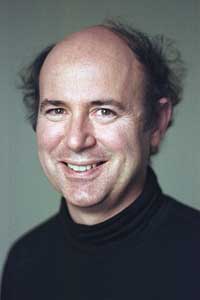Alumnus, former trustee shares Nobel in Physics
By Steve KoppesNews Office
 Frank Wilczek | |
Frank Wilczek, a University alumnus and a former University Trustee, has received the 2004 Nobel Prize in Physics, the Royal Swedish Academy of Sciences has announced.
Now the Herman Feshbach professor of physics at the Massachusetts Institute of Technology, Wilczek received the prize for work he did as a doctoral student in physics at Princeton University, “but he did many other very important things afterwards. He’s a brilliant guy,” said Peter Freund, Professor Emeritus in Physics and the College.
Freund remembers Wilczek—who currently serves on the Trustee Advisory Committee on Scientific Research and Outreach at the University—as an extremely gifted undergraduate student in his particle physics class for advanced graduate students.
Wilczek told Freund he was planning to study mathematics in graduate school at Princeton University. “He made such a strong impression on me that I forcefully urged him to study physics instead,” Freund said.
Wilczek completed his master’s degree in mathematics in 1972 and his doctoral degree in physics in 1974, both at Princeton University.
A few years later, when Wilczek returned to the Chicago campus to deliver a research seminar to the Enrico Fermi Institute’s theory group, he thanked Freund for his advice.
Wilczek received his S.B. in Mathematics from the University in 1970. He served on the University’s Board of Trustees from 1998 until 2003.
Counting Wilczek, 76 Nobel laureates have been faculty members, students or researchers at Chicago. His is the 26th Nobel Prize in Physics connected to the University.
In a congratulatory note to Wilczek, President Randel wrote, “All of us here are grateful for the ways in which you have served the University and are proud of our association with you.”
Wilczek shares the prize with David Gross of the Kavli Institute for Theoretical Physics at the University of California, Santa Barbara, and H. David Politzer of the California Institute of Technology. The Swedish Academy cited the scientists “for the discovery of asymptotic freedom in the theory of the strong interaction” in 1973.
Asymptotic freedom describes how the strong force governs the behavior of quarks, the smallest building blocks of matter. When quarks are close to each other, the strong force acts so weakly that quarks behave almost as if they are free particles. But, like a rubber band, the force binds the quarks more tightly as they move farther apart.
The strong force is one of four fundamental forces of nature, along with electromagnetism, the weak force and gravity. The work by Gross, Politzer and Wilczek helped physicists connect the strong force with electromagnetism, which governs the behavior of charged particles, and the weak force, which governs radioactive decay.
“Thanks to their discovery,” noted the Royal Swedish Academy statement, “David Gross, David Politzer and Frank Wilczek have brought physics one step closer to fulfilling a grand dream, to formulate a unified theory comprising gravity as well—a theory for everything.”
![[Chronicle]](/images/sidebar_header_oct06.gif)